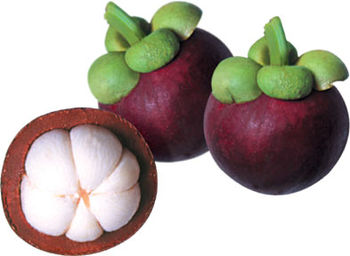Mangosteen
Other Names: Amibiasine, Fruit des Rois, Garcinia mangostana, Jus de Xango, Mang Cut, Manggis, Manggistan, Mangosta, Mangostan, Mangostán, Mangostana, Mangostanier, Mangostao, Mangostier, Mangoustanier, Mangouste, Mangoustier, Manguita, Meseter, Queen of Fruits, Sementah, Semetah, Xango, Xango Juice.
Mangosteen is a tropical fruit. The fruit, fruit juice, rind, twig, and bark are used as medicine. Some of the most powerful antioxidants in the world might come from the rind of a tropical fruit called mangosteen—with extraordinary potential against ailments ranging from infection ... to cancer ... to mental health issues. Despite the similarities in name, the mangosteen (Garcinia mangostana) is not related to the mango. Once you discover the extent of the mangosteen's curative and preventative powers, you'll never confuse the two again! The mangosteen is a dark purple fruit that thrives in the hot, humid climates of Thailand, Malaysia, Singapore, Vietnam, and Indonesia. The flesh of the mangosteen has a sweet, tangy flavor, but it's the hard pericarp—or rind, which can be nearly an inch thick—that contains all the nutritive value.
Special Precautions of Mangosteen
Research indicates that xanthones may interfere with normal blood-clotting. It's not known whether mangosteen xanthones may interact with blood-thinning medication such as warfarin and possibly lead to bleeding.Studies suggest that higher doses of xanthones may depress the central nervous system in animals and cause sedation. Xanthones may cause excess sedation when combined with other herbs or medication, and it may be toxic at higher doses. Human studies have not been conducted.
The benefits of Mangosteen are
Mangosteen is used for diarrhea, urinary tract infections (UTIs), gonorrhea, thrush, tuberculosis, menstrual disorders, cancer, osteoarthritis, skin infections, wounds and an intestinal infection called dysentery. It is also used for stimulating the immune system and improving mental health.
- The mangosteen rind contains more than 40 chemical compounds called xanthones. These natural compounds are the most powerful antioxidants found in nature. They offer a wealth of benefits such as repairing cell damage from free radicals ... warding off degenerative disease ... and preventing mental deterioration. All xanthones have similar molecular structures, but each has a unique chemical composition. Some of the most important xanthones are: Alpha-mangostin, a potent antioxidant, Beta-mangostin, Gamma-mangostin, a powerful anti-inflammatory, Garcinone B, Garcinone E, a vital anti-tumor agent. According to Sloan-Kettering's Integrative Medicine online information portal, the xanthones found in the mangosteen have potency against bacteria, fungus, and microbes, and are also antiseptic and anti-inflammatory.
- A Promising Anti-Cancer Treatment : At this point, almost all studies on mangosteen have been done in test tubes. However, the early research looks promising. A 2006 study in Bangkok, Thailand found several kinds of xanthones in mangosteen to be cytotoxic. Cytotoxic substances (like chemo and radiation) target and kill cancer cells. Then in 2008, faculty from the College of Pharmacy at the University of Illinois screened 12 xanthones. Four of them were formidable aromatase-inhibitors—compounds that lower estrogen levels. That means they can successfully treat estrogen-dependent tumors. The study's abstract notes that xanthones could play an important role in breast cancer treatment. Taiwanese researchers found that garcinone E, a mangosteen xanthone derivative, induces death in liver, lung, and gastric cancer cells. Another Taiwanese study found that mangosteen xanthones act as powerful anti-tumor agents. A Japanese study into the xanthone alpha-mangostin concluded that this xanthone is also a promising cancer preventive and treatment, in part due to its ability to inhibit the growth of human leukemia cells. Another Japanese study, conducted by researchers from the University of the Ryukyus in Okinawa, found that long-term exposure to alpha-mangostin appears to suppress tumor development.
- Mangosteen and Mental Health : Mangosteen may become a revolutionary natural option for treating mental health problems. Indeed, researchers believe mangosteen could eventually be used to treat depression ... generalized anxiety disorder ... and social phobias. One especially exciting study was published recently in the Journal of Ethnopharmacology. The researchers were following up on reports that the xanthones in mangosteen are the same as the active ingredients in St. John's Wort, the popular and proven effective herbal antidepressant. Xanthones have been shown to... Help the mind think more clearly and adapt better. Provide a sense of stability and well-being. Stop damage to neurons that otherwise prevents them from maturing and replicating properly. Support healthy functioning of cell walls and neurotransmitters.
- Alzheimer's Disease : highly potent compounds called xanthones present in mangosteen may help resolve the inflammation within brain tissue. These studies are quite promising indeed as they reveal that managosteen may be capable of addressing the inflammation in the brain that is being linked to Alzheimer's dementia disease.
- Arthritis : the mangosteen tree’s dark purple berries have anti-inflammatory properties : especially beneficial for muscles and joints.
- Infections : mangosteen and its extracts have proven highly effective at inhibiting the growth of the infectious bacteria Mycobacterium tuberculosis and Staphylococcus aureus, including the drug-resistant form of the latter known as Methicillin-resistant Staphylococcus aureus (MRSA). Mangosteen seems especially effective against bacteria that infect the skin, and therefore has also shown promise as an acne treatment.
